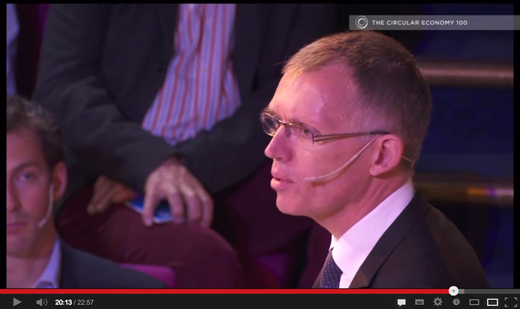Renault ‘walks the talk’ at CE100
Just how does a major multi-national car manufacturer transition to a circular economy business model? This was the topic addressed by Carlos Tavares, former COO of Renault, at the recent Circular Economy 100 Annual Summit.
Within the context of big business embracing the responsibility of driving sustainable consumption and reducing the strain on Earth’s resources, Tavares was asked to expound on Renault’s circular economy activities and how Renault and the wider automotive industry could benefit from adopting a ‘circular’ business model.
Firstly, circular economy thinking opens the door to breakthroughs, said Tavares. As a result of Renault’s ‘Kaizen’ continuous improvement philosophy and circular economy focus, the company is already starting to transform the way it does business around the world, which is yielding positive business and sustainability results. The company has made particular progress since becoming a founding member of the Ellen MacArthur Foundation four years ago, Tavares explained.
The importance of the circular economy to business
Despite the fact that his generation tended to be thoughtful consumers and took care to save money and respond respectfully to resource constraints, Tavares said that it was nevertheless the same generation that mismanaged raw materials and promoted the linear business model which has brought us to the edge of our impending resource crisis.
By not integrating their personal philosophy into business practices, these business leaders also largely failed to recognise the financial benefits of a circular economy. Now, there is no time to lose in understanding these benefits.
Similarly, while buzzwords such as ‘reduce, reuse, recycle’ belonged solely to environmentalists 20 years ago, they should now be central to business leaders’ vocabulary. And businesses should be leaders in this area because their success depends on the availability of raw materials, said Tavares. He went further to state that in fact, the circular economy is about more than the environment – it’s about creating stable business conditions and ensuring profitability.
For example, the wild price fluctuation of steel that took place between 2004 and 2008 was a result of linear thinking. The sustainable use of resources helps to guard against market volatility, reducing financial risk.
Renault’s progression to the circular economy
Renault has four zero-emission electric vehicles and is the only vehicle manufacturer to have created a full zero-emission product range. It has forecast sales of 36,000 units in 2013. This is a result of Renault and Nissan investing in zero emission technology 14 years ago. And they did this because it was the right investment to make to ensure the long-term viability of their industry.
Despite its progress in developing zero-emission technology, Renault still sells primarily combustion-powered vehicles, with 80m cars sold in 2012 and an anticipated 200m by 2020, as the global population rockets. Clearly, this trajectory cannot be maintained. The automotive industry has no choice – it has to do business differently.
Maximising the value of materials in end-of-life vehicles (ELVs) is vital, Tavares believes. He highlighted that each car contains high quality materials worth 2,500 euros. This is because cars are made to be durable. And because of that, these materials maintain a high residual value. So, the car can to provide value, not least as it’s designed to be dismantled for repairs. In this way, the circular economy is a part of car’s manufacturing DNA.
Renault is also using more recycled materials in its manufacturing operation. Recycled materials constitute some 25% of the weight of a new Renault. And in addition to saving natural resources by consuming fewer virgin raw materials, businesses can benefit from the significant price differential that exists between these and recycled materials (up to 20%).
At Renault’s plant in Choisy-le-Roi, the company is producing 120m euros of reconditioned powertrain parts annually, although Tavares explained that these are only guaranteed for a year. In the EU, 60% of powertrain repairs rely on reconditioned powertrain parts, so this presents a good business opportunity.
As the company strives to find more ways to close the loop, keep its products competitively priced and use natural resources sustainably, it will be ramping up its efforts to remanufacture more parts (both mechanical and electronic). For example, one initiative will entail batteries in electric cars – if the battery falls below 25% capacity, Renault plans to recondition the battery at no cost to the consumer.
Renault is also investing in new expertise to expand its recycling capacity. It has invested in two specialist companies specialising in waste and end-of-life materials.
Moving towards a service-based model
Interestingly, Tavares believes that in order to survive, the automotive industry will need to move from producing and selling cars to selling ‘mobility services’. Just in the same way that the mobile phone industry is now capitalising on sales of minutes and services rather than physical units, carmakers will need to recognise that changing the nature of ownership will transform relationships across the value chain.
Notably, the customer will benefit from the assurance of driving an affordable, reliable car while the manufacture will develop good customer relationships and fully optimise the product lifecycle. Manufacturers could even consider selling raw materials to their Tier 1 suppliers.
However, moving ‘beyond property’ will not be easy. Tavares welcomed more expertise and collaborations with fellow auto industry players as well as the Ellen MacArthur Foundation. The company has just confirmed it is extending its contract with the EMF for another three years.
Finally, making the circular economy a reality will require every business to be confident that the circular model is more competitive, sustainable and ultimately, more profitable than the traditional linear way of doing business. While the transition may be hastened by deepening resource loss, it still requires the complete dedication of business leaders, if it is to be successful.

